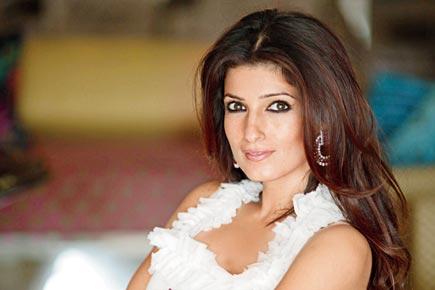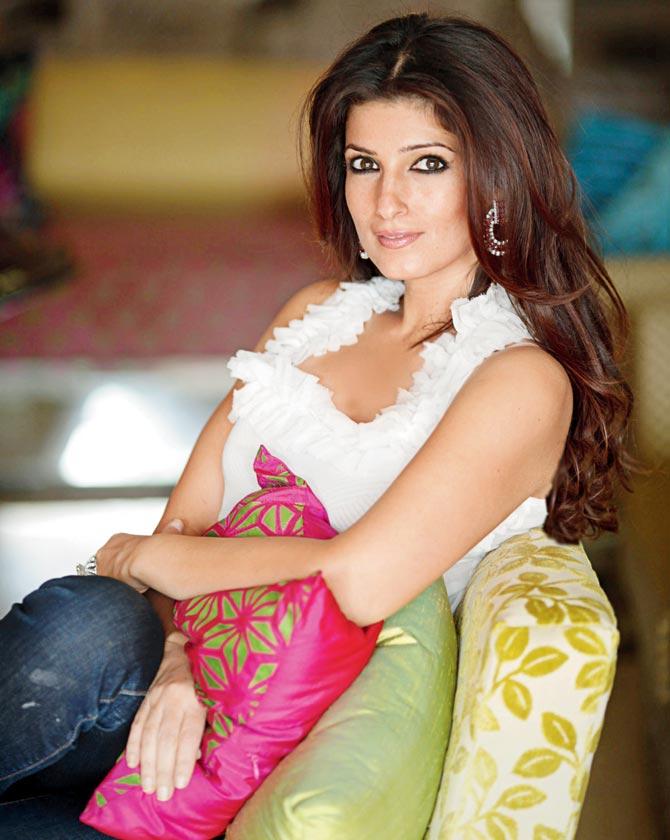Twinkle Khanna’s shot at fiction sheds her urban voice for earthy, tug-at-the-heart stories. She opens up about being funny, her family’s antics and how she was bitten by the writing bug


ADVERTISEMENT
When we flip through the pages of her second book, Twinkle Khanna manages to make us forget the many roles she has effortlessly essayed. Her latest, a collection of short stories, bears no traces of her life as an actor, entrepreneur, celebrity wife, star kid, columnist and mother. The Legend of Lakshmi Prasad (Juggernaut) brings to life a diverse bunch of characters; some set in a rural milieu.
Khanna looks smart in a semiformal cream jacket and jeans when she steps into her sea-facing office in Juhu. Sensing our serious tone, she mocks us for not accepting anything except water, instantly breaking the ice. Soon, we discover that while she is warm, witty and candid much like her writing, her biggest draw is a natural flair for finding humour in mundane situations.
“I am in an interview and that’s why I can’t abuse you right now,” she tells her son, Aarav who is on the phone, asking her why she’s being nice to him. Her chat with us is interrupted twice more by phone calls from her mother and husband. “Be discreet, I’m in an interview,” she warns her actor-husband Akshay Kumar, over Facetime. When he asks her who she’s being interviewed by she turns the phone camera to face us for a quick dekho. Over cups of green tea, she admits that she speaks faster than she thinks. We find no reason to believe otherwise. Excerpts from a chat:
How did you decide to write fiction?
Even before we did Mrs Funnybones, I had wanted to do a pre-partition, fictional story about a Muslim family. My editor, Chiki Sarkar, felt that I was already being recognised for the Mrs Funny Bones voice and I should continue that in my first book. So, Lakshmi Prasad wasn’t a leap in that way. I always wanted to do this.
Did you plan on writing short stories?
I had started writing the tenth chapter of a book. At the time, while researching for a column I was writing on menstruation, I came across Muruga’s story. This is the last story in the book, called the Sanitary Man. It’s a fictionalised account of his life. I was obsessed with it for a long time and my mind could only focus on it. Here was a man who was more feminist than many women and wanted to free them of the taboos of something that was intimate to them. So, I wrote five pages as you see it in the book, where he is on a cycle and is passing by his town where he is ostracised. You are in the middle of the story and don’t know why he’s ostracised. After writing it, I sent it to my editor suggesting that this is what I felt compelled to write. Next, I started chasing him. He’s an evasive character. I chased him all around the world. Finally, I met him and conducted lengthy interviews and wrote it. So, I completed that first, then Lakshmi, followed by If the Weather Permits, Salaam and Noni Appa.
What inspired the other characters?
I knew a woman once who was in a bad marriage where she had to eat the leftovers of her in-laws plate. That stayed with me. The story of Lakshmi Prasad came from there. Noni Appa Is an amalgamation of a lot of people I know, so is Binny who is odder than her sister. I have a wide variety of family and friends whose lives I pick instances from. I had a friend whose grandmother had hearing aid that was a constant problem and she would conveniently not hear things when she didn't want to.
The feminist angle is hard to miss...
When you choose what to write about; your attitude and your impression of life flow through it. It's not like I go around with a signboard saying I'm feminist but I am a feminist and I don't see why people shy away from the word. It's the need for equal opportunities for both genders. There is nothing beyond that, there's just a fallacy that there is. The choices I've made in life like keeping my maiden surname was done 15 years ago when there wasn't much awareness about feminism. It's how I grew up.
Lakshmi’s rural setting differs from your urban-voiced column.
It is. Noni Appa is more my voice like it is known. Lakshmi is set in 1920. I did research on the kind of things available in that region, what people ate during Chhath Puja, what their homes would look like, their apparel and other details of ingredients. Then I plotted the story out and wrote it. When I was writing it, I knew it wasn’t the expected Funnybones voice. I sent it to my editor, who loved it instantly, which was gratifying. So I didn’t get into the stereotype of what people expected me to do. When have I ever done that? I wrote the stories the way they needed to be told.
Is writing your calling?
When I was younger, I had a file of bad poems, and half a book at 18. In the story Noni Appa, there is one para that is unchanged from that book. I have tried to write the same story over a period of time and this is my third attempt. I have always been immersed in a world of books with ideas, quotes and characters running in my head as a reader. I knew I would do this at 60 but I’m doing it now. One day, science will make everyone immortal and I don’t think I’ll be around that long. This is my bid at immortality. You achieve a bit through your children and the rest with work.
Humour has been your strength.
For my column, I get away with saying a lot of things because it’s cloaked in humour. I have also realised that the minute you give people a lecture, they switch off. With laughter, your mind and body are lost. It’s an explosion. You can’t pre-empt it. When you make someone laugh they can never look at the same situation again without smirking at it.
Do you worry about offending people?
Yes. Writing is a blessing where I can refine my thoughts. But while talking before I’ve thought things have come out. While writing, I weigh my words. I worry about hurting people unintentionally. Am I worried about taking a stance that offends people, even a majority? No.
Did you ever get into trouble?
I had written a piece once about a religious person and many of his followers got offended. The piece was an analysis of a situation, taking place of which Itook two lines and tweeted it. Without context it may have been offensive. I felt immensely pressurized then. Religious sentiments seem most fragile.
Is your mother’s and sister’s taste in books like yours?
It’s very different. My mom prefers non-fiction. My sister reads books set in a French countryside where someone owns a pastry shop. I don’t what to call this genre. I read science fiction. Their books also look more pristine while mine looks like my dog mangles them, by the time I’m done. I’m reading Music Room now, and am trying to keep it in a good condition because it's an autographed copy.
Do they like your books?
They read Mrs Funnybones and all my columns. When I gave my mom the book and asked if she had read it, she told me she kept it in the temple. So, I told her if God wants to read it, he’s everywhere so you can keep it anywhere. We are not the kind of family where we let each other fly too high. Recently, we were at a bookshop in Delhi where a reader walked up to my mother and said, “Your daughter’s a good writer.” She pointed to me across the store and said, “Who? This junglee?” I died of embarrassment. I think my mom gets embarrassed when people say these things. I can’t walk around with my nose in the air because my mom is always there to point out what’s stuck up my nostril.
What's your next?
I am working on an idea about the dystopian future in India. It’s been in my head for many months now but let’s see.
 Subscribe today by clicking the link and stay updated with the latest news!" Click here!
Subscribe today by clicking the link and stay updated with the latest news!" Click here!






